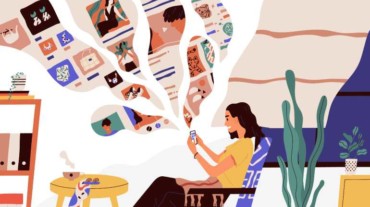
The ongoing coronavirus pandemic has meant more time at home for everyone. While people have turned to cooking, reading, among other activities to deal with the health crisis—which brings a fresh supply of stress every day—the use of social media apps has also spiked.
With nowhere to go and no respite from the pandemic, spending more and more time on apps like Facebook and Instagram is but natural. As commonplace as the addiction to social media might have become, it’s side effects are still worrisome—with a study from Singapore suggesting that it can make people feel lonelier.
According to a recent study led by Nanyang Technological University, Singapore, the use of online messaging and social media apps among Singapore residents has spiked during the covid-19 pandemic.
About 75% respondents in the online survey said that their use of WhatsApp during the pandemic increased. This was followed by Telegram (60.3%), Facebook (60.2%) and Instagram (59.7%).

Accompanying this spike is videoconferencing fatigue, found the NTU Singapore study, which surveyed 1,606 Singapore residents from December 17 to 31 last year. Nearly 44% said they felt drained from videoconferencing activities, which became more frequent during the covid-19 outbreak.
The increased use of online communication tools could in part be driven by feelings of isolation, said the researchers. When asked how often they felt they lacked companionship, 35% of the respondents indicated they have felt this way sometimes, while 19% felt this way often or very often. Some 32% also reported feeling left out sometimes, while 18% said they felt left out often or very often.
Associate Professor Edson C Tandoc Jr, the Director at IN-cube said: “The significant correlation between the use of online communication tools and feelings of isolation from the survey results may help explain why most of our respondents reported an increase in their use of online communication tools in the past few months, as they turn to these tools to feel connected to others even when physical interactions have to be limited.”
Also, watch:
“Social interaction through these online communication tools definitely brings about new challenges. Some may feel as if they are always on call at work or among their friends. Others may be uncomfortable with turning their cameras on during a video call or may not have a stable internet connection. With these difficulties and limitations in mind, we need to be mindful of our expectations of others when we are using these tools or when we ask others to use them,” Tandoc Jr added.
Select Topics of your interest and let us customize your feed.
PERSONALISE NOW